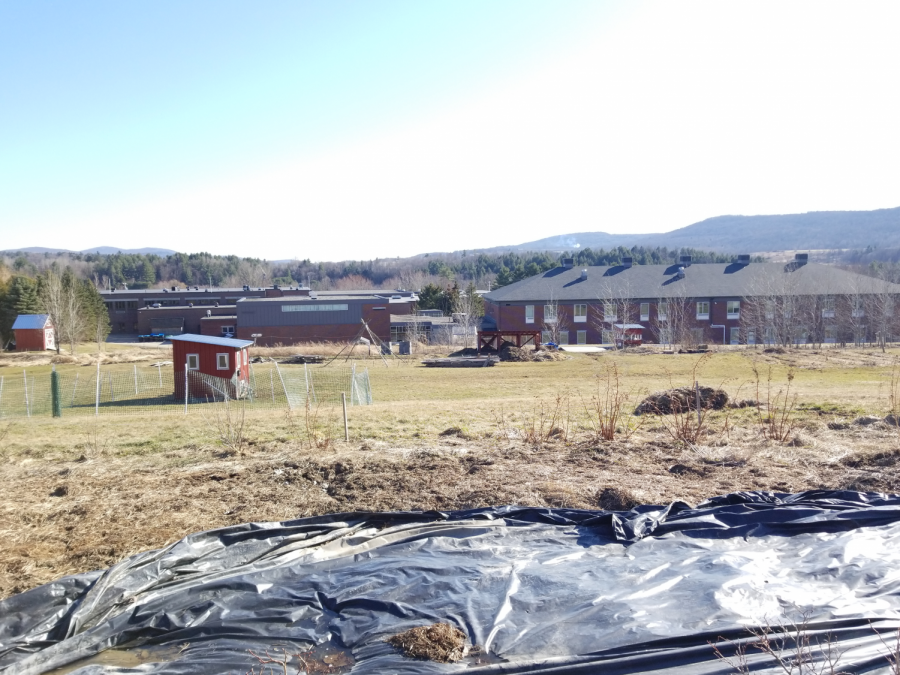BFA Fairfax school farm still running during COVID-19
Editor’s Note: this is a follow-up story to an earlier article about the BFA Fairfax Farm to School program, which you can read here.
Black tarp covers several of the garden plots. Others are layered with hay, or growing cover crops and weeds. In the greenhouse, recently seeded pots are labeled with plastic tags. The bees are healthy, but quiet in the cold. Amidst the silence and social distancing of the COVID-19 outbreak, the BFA Fairfax school farm is being quietly cared for.
Despite Governor Scott’s stay at home directive in place until May 15, Fred Griffin has continued his work on the farm since school has been let out. “We can’t have a program in September if we don’t have a garden,” he says. He keeps his work to a minimum and says that the farm is in maintenance mode. “I just planted the bare minimum that the garden needs.”
Griffin says most of his time is spent feeding the chickens and the bees or working in the greenhouse. “We fed them pollen patties, which… they need as they’re waiting for their pollen sources to develop,” he says. Griffin checks on the farm in the morning and afternoon each day.
Griffin has also had help on the farm from several community members. Griffin says that he had “people lined up to help with” planting 150 asparagus roots. Griffin says this nursery will be an important part of keeping the Harvest Dinner achievable this autumn.
“Volunteers want to help with the chickens,” he says. “I notify them when it’s time to move the fence to a new pasture area.” Griffin says that while there are volunteers on the farm, they all wear gloves and masks, and practice social distancing.
Construction has stopped on the farm. The program’s sugar house has been postponed until further notice. Griffin says the farm “won’t be generating any… new compost,” over the summer. Because school is closed, the in-class compost buckets aren’t even being filled, let alone emptied on the farm.
COVID-19 brings a lot of fast changes, but Griffin is keeping up. He says the farm is doing remarkably well, and he has few worries about its success in the fall. “We have enough community help to do the maintenance work to come into fall… with our outdoor classroom intact.”
Griffin says that before the stay at home order, the farm was “ready to start moving the program outdoors,” but they “never got a chance.” Griffin says that the school closings and stay at home directives were unexpected at Fairfax, where “nobody was doing anything different,” and that “school was disbanded before any practices like social distancing or extended hand washing took place.”
Griffin says the transition to online classes has been difficult for him. “It just feels very burdensome,” he says. “It just kind of blends into this very long, monotonous, leaden thing.” Griffin says replacing work for the Farm to School class has been difficult, but he is available by email to help students with their online assignments.
Griffin says his wife, Elizabeth Griffin, had to stop working at the local food shelf, which the farm would typically donate its surplus produce to. It is now being operated by the high school nurses.
At the end of the day, and at the end of the COVID-19 outbreak, Griffin says he believes the Fairfax community and the Farm to School program will support each other. “Anything that comes out of the farm is going to be added to the food shelf,” he says.
“The Harvest dinner will depend on… the garden, which will depend on… the community’s support,” he says. Griffin is confident the farm will be in good condition for the students to return to in the fall. Between healthy chickens, two full beehives, and a bed of asparagus, Griffin says “there’ll be a full-scale garden out there.”

Senior, Creative Writing
From Fletcher, VT
Spring 2020-Present
"Call me mommy and I'll bring you blankets and hold you while you cry."



